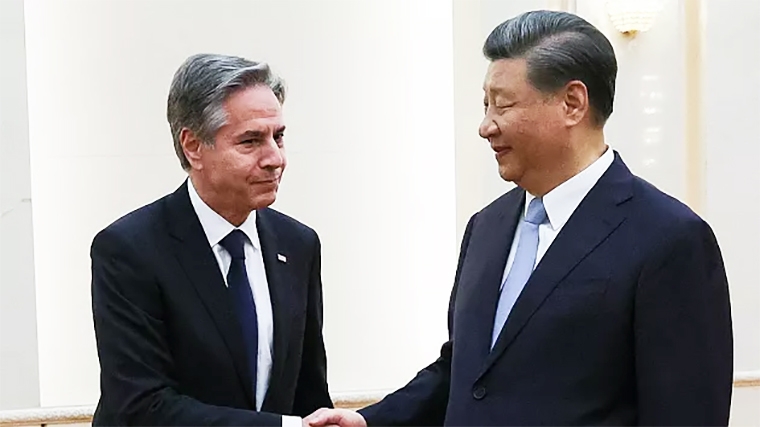
US Secretary of State Antony Blinken’s long-delayed trip to Beijing has come and gone. Despite the predictable optimistic spin on the visit – both sides agreed to strengthen people-to-people exchanges and promised to continue talks – it did little to defuse the increasingly fraught conflict between the United States and China.
The failure to reestablish military-to-military communications is especially worrisome, given the recent spate of near-misses between the two superpowers’ warships in the Taiwan Strait and aircraft over the South China Sea. And this is to say nothing of reported Chinese surveillance and military activity in Cuba, which bears an eerie resemblance to the events that precipitated the Cuban Missile Crisis of 1962 – one of the most frightening moments of the Cold War. The risks of accidental conflict, as underscored in my recent book, remain high.
The underlying problem is overreliance on personalised diplomacy. Yes, that played a crucial role in the early days of the US-China relationship. More than just stagecraft, US President Richard Nixon’s historic trip to China in 1972 was a decisive strategic gambit aimed at the triangulation of the former Soviet Union. Multiple layers of personal connections helped to tip the balance of power in the first Cold War: Nixon and Mao Zedong at the top, underpinned by Henry Kissinger and Zhou Enlai working out the details of US-China engagement.
But those days are over. Personalised diplomacy has outlived its usefulness. With management of the US-China relationship in the hands of politically constrained, thin-skinned leaders, disputes between the two superpowers have become exceedingly difficult to resolve. Neither leader can afford to be seen as weak. Conflict resolution is now more about face, less about grand strategy.
President Xi Jinping, for example, insisted on sitting at the head of the table in his brief 35-minute meeting with Blinken, casting America’s senior diplomat in a decidedly subservient light. And no sooner had Blinken left the country than President Joe Biden referred to the Chinese leader as a dictator, further inflaming the sensitivities of a country steeped in the painful memories of a century of humiliation.
Such an approach no longer works because diplomacy derives its legitimacy from domestic politics. On the American side, poisonous anti-China sentiment tied Blinken’s hands long before he set foot in Beijing. US Representative Mike Gallagher, the Republican Chairman of the new House Select Committee on China, has the audacity to blame America’s China problem on engagement, arguing on CNBC and in the Wall Street Journal that “engagement invariably leads to appeasement in the face of foreign aggression.”
Unfortunately, Gallagher speaks for a strident anti-China Washington consensus, and that left Blinken with few options. Bipartisan support of such an extreme view all but ruled out any creative US diplomacy.
Despite its one-party system, domestic political considerations are equally important in China. The legitimacy of Xi’s power rests on his so-called Chinese Dream, which promises “the great rejuvenation of the Chinese nation.” Yet without sustained economic growth, Xi risks breaking that promise and facing a wave of public and Party anger.
That makes China’s current growth shortfall especially concerning. While a widely expected stimulus could alleviate near-term pressures on the economy, the confluence of demographic and productivity headwinds is far more problematic for medium- to longer-term growth prospects. Add to that the foregone growth that comes from ongoing conflict with the US and its allies, and there can be little doubt that Chinese politics are tightly constrained by the country’s mounting “rejuvenation deficit.”
Fragile egos only exacerbate the problem. Rhetorical miscues, such as Biden’s “autocracy versus democracy” framework; stagecraft, such as Xi’s chair positioning; and name-calling, such as Biden’s “dictator” jab – all get blown out of proportion. When leaders lack the tough skin required for conflict resolution, the hair-trigger reactions of personalised diplomacy backfire.
A new approach is urgently needed. Shifting to a more institutionalised model of engagement would take conflict resolution out of the hands of hyper-reactive, politically constrained leaders. That means reworking the architecture of US-China engagement to be more process-oriented, to incorporate greater technical expertise at the working-group level, and to focus more on a strategy of mutual problem-solving.
My proposal for a US-China secretariat goes well beyond earlier attempts at institutional engagement – namely, the Strategic and Economic Dialogue and the Joint Commission on Commerce and Trade. Both efforts failed to prevent the current conflict, before being canceled by the Trump administration (Biden has opted not to resuscitate the initiatives). But that is because they didn’t go far enough in providing a permanent, robust framework for relationship management.
Like most, I am suspicious of a bureaucratic approach to multiple thorny problems between two powerful countries. The Washington consensus believes the Chinese have long favoured talk over action, process over compliance, temporising over compromise. A new bureaucracy, the argument goes, would add complexity and layers of decision-making to the already-challenging task of addressing fundamental disagreements between contrasting systems. Progress will still be difficult.
Still, a more institutionalised approach is preferable to the current politicised, personalised diplomacy. What worked 50 years ago doesn’t work today. The context is very different for both countries: China is now a legitimate challenger to the incumbent hegemon. Conflict resolution needs far more than a latter-day Nixon going to China.
Personalised diplomacy is at a dead end in resolving the US-China conflict. Escaping from the quagmire of escalating tensions requires a new architecture of engagement. A US-China secretariat is the best option to navigate the long and arduous path of conflict resolution – before it is too late.
*Stephen S. Roach, a former chairman of Morgan Stanley Asia, is a faculty member at Yale University and the author of the forthcoming Accidental Conflict: America, China, and the Clash of False Narratives (Yale University Press, November 2022). Copyright: Project Syndicate, 2023, published here with permission.
3 Comments
The underlying problem is overreliance on personalised diplomacy.
as long as America still upholds a "contain China" policy, no diplomacy will save the conflicts between China and US.
The Yanks feel rightly pissed that China just took what it couldn't buy. And this after they hoped that a more prosperous China would lead them to some form of liberalising of their society. China doesn't do liberal & the Yanks found that out to their cost. America almost bankrupted their own working classes in the endeavour to do so. In short, they gave a lot in pursuit of their ever higher profits, which didn't go down that well in the rust belts.
Greed tends to get you in the end & many would say they got what they deserved after selling out their own people. But wait, the reality at ground zero at the time was that American labour had become so expensive, they had effectively priced themselves off the global market. Also true. One-all.
Now we find ourselves in a situation where the American sponsored Chinese economic miracle is so big, that it's started to shout back every time the Americans call foul. Such is life at the big end of town.
The current de-risking going on by the west & co is already hurting China in the pocket. Millions have lost their jobs already. Inside the big cities of China vast ghost areas are popping up all over the place. More than a million employees have followed their employers who have moved their operations to Vietnam to try & side-step the anti-Chinese sentiment. Indeed, the Chinese are also big buyers of industrial lands in Mexico as they try to position themselves inside the Americas, once again, to keep supplying the great America industrial machine.
So, where to from here? As the article reports, things are still pretty tense. Neither side has the political balls big enough to talk their way through any of this. As yet. Perhaps this is an opportunity for a small third party to step into the breach & try to broker a deal somehow. Someone who knows both sides well enough, & who both sides trust enough, to try & get something workable over the line here.
John Key always thought we were were pretty good negotiators. Perhaps this is our time to step up & be brave? Perhaps Helen Clarke could join Key in helping to put something constructive together? Wouldn't hurt that much would it?
You are well informed. Refreshing to read a comment from somebody who actually has done some background research.

We welcome your comments below. If you are not already registered, please register to comment
Remember we welcome robust, respectful and insightful debate. We don't welcome abusive or defamatory comments and will de-register those repeatedly making such comments. Our current comment policy is here.